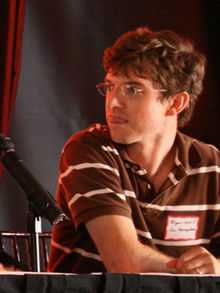Bryan Cantrill

Bryan M. Cantrill (born 1973) is an American software engineer who worked at Sun Microsystems and later at Oracle Corporation following its acquisition of Sun. He left Oracle on July 25, 2010[1] to become the Vice President of Engineering at Joyent.[2]
Cantrill was born in Vermont, later moving to Colorado, where he attained the rank of Eagle Scout. He studied computer science at Brown University, spending two summers at QNX Software Systems doing kernel development. Upon completing his B.Sc. in 1996, he immediately joined Sun Microsystems to work with Jeff Bonwick in the Solaris Performance Group.
In 2005 Bryan Cantrill was named one of the 35 Top Young Innovators by Technology Review, MIT's magazine. Cantrill was included in the TR35 list for his development of DTrace, a function of the OS Solaris 10 that provides a non-invasive means for real-time tracing and diagnosis of software. Sun technologies and technologists, including DTrace and Cantrill, also received an InfoWorld Innovators Award that year.[3] In 2006, "The DTrace trouble-shooting software from Sun was chosen as the Gold winner in The Wall Street Journal's 2006 Technology Innovation Awards contest."[4] In 2008, Cantrill, Mike Shapiro and Adam Leventhal were recognized with the USENIX Software Tools User Group (STUG) award for "the provision of a significant enabling technology."[5]
Together with Shapiro and Leventhal, Cantrill founded Fishworks,[6] a stealth project within Sun Microsystems which produced the Sun Storage 7000 Unified Storage Systems.
He is a member of the ACM Queue Editorial Board.[7]
Articles
- Bryan Cantrill (2006-02-01). "Hidden in Plain Sight". ACM Queue 4 (1): 26–36. doi:10.1145/1117389.1117401. Retrieved 2012-02-01.
- Bryan Cantrill, Jeff Bonwick (2008-09-01). "Real-World Concurrency". ACM Queue 6 (5): 16. doi:10.1145/1454456.1454462. Retrieved 2012-02-01.
- Bryan M. Cantrill, Michael W. Shapiro and Adam H. Leventhal (2004-06-10). "Dynamic Instrumentation of Production Systems". Proceedings of the 2004 USENIX Annual Technical Conference. Retrieved 2012-02-01.
- Bryan M. Cantrill, Thomas W. Doeppner (1996-08-15). "ThreadMon: A Tool for Monitoring Multithreaded Program Performance". 30th Hawaii International Conference on System Sciences (HICSS) Volume 1: Software Technology and Architecture. Retrieved 2012-02-01.
References
- ↑ Bryan Cantrill (2010-07-25). "Good-bye, Sun".
- ↑ Bryan Cantrill (2010-07-30). "Hello Joyent!".
- ↑ Neil McAllister (2005-08-01). "DTrace and Predictive Self-Healing herald Sun’s future". InfoWorld.
- ↑ Michael Totty (2006-11-11). "The Winners Are...". The Washington Post.
- ↑ "STUG Award". USENIX. 2008.
- ↑ Bryan Cantrill (2008-11-10). "Fishworks: Now it can be told".
- ↑ "ACM Queue Editorial Board". ACM. Retrieved 2012-02-01.
External links
- "Bryan Cantrill's blog".
- "DTrace Review". Google Tech Talks. 2007-08-15.
- "But why?". Have you ever kissed a girl? - Bryan Cantrill's famous response to Linux Kernel hacker David S. Miller.